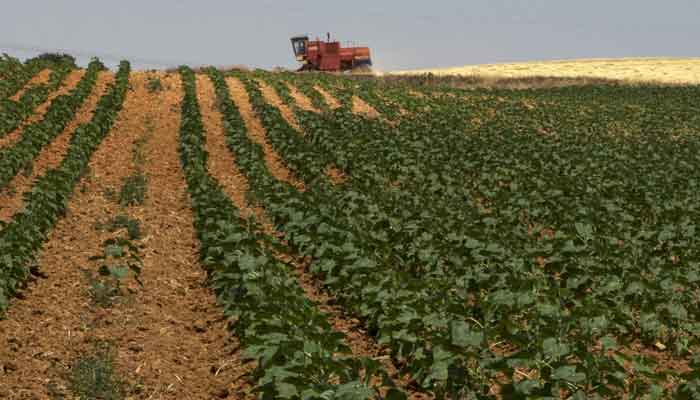Army not gifted 45,000 acres of land: Punjab govt official
Official says while land ownership would remain with Punjab govt, army would bear project cost
March 28, 2023

- Official says ownership of land remains with Punjab govt.
- Pakistan Army is only providing a management structure, he adds.
- Agreement between army, govt was over joint venture for cultivation of barren land.
LAHORE: Following criticism, officials in the Punjab government have been prompted to issue a clarification and provide a rationale for the allocation of 45,000 acres of land to the Pakistan Army for a corporate agriculture farming project, The News reported Tuesday.
A senior government official, on the condition of anonymity, said: "From the onset, it should be clear that the ownership of the land remains with the Punjab government."
“The Pakistan Army is only providing a management structure; the corporate sector and local farmers will also be involved in the cultivation process,” he added.
The official explained that the agreement between the Punjab government and the army was over a joint venture for the cultivation of barren land.
“These lands have remained uncultivated for years and need a strong management system to make them fertile. The efforts required are beyond the capacity of a group of individuals — institutional support at multiple levels is required to make these huge swathes of land productive,” he argued.
The official said that the most important feature of the agreement was that while the ownership of the land would remain with the Punjab government, the army would bear the project cost, along with the corporate sector as well as local and international investors.
“The project will be executed by local farmers and the army will only provide a management structure for the project.”
Another official involved in the project explained that it was inspired by China’s strategies to enhance agricultural productivity.
“Cultivation of barren land is an essential aspect of ensuring food security, especially in countries where arable land is scarce. China has been at the forefront of implementing strategies which have enhanced agricultural productivity, including the cultivation of barren land. There are many lessons for Pakistan in the success of the Chinese model,” the official said.
“The Chinese model of cultivating barren land for food security involves a combination of government policies, private investments and technological innovations,” the official said.
“A key strategy adopted by China in cultivating barren land was the use of modern technology; including the use of irrigation systems, mechanised farming equipment and high-yield crop varieties. These technologies have helped increase agricultural productivity and make it possible to grow crops on previously barren land. The Chinese government also encouraged private investment in agriculture, particularly in the development of barren land. This includes tax incentives, subsidies, and support for smallholder farmers. Through these policies, the government has created a favourable environment for private investment, which has contributed to the development of barren land and increased agricultural productivity,” the official explained.
“Another critical aspect of the Chinese model is the focus on sustainable agriculture. The government has encouraged the use of organic farming practices and the development of sustainable farming systems that promote soil conservation and biodiversity. This approach has helped to minimise the environmental impact of agricultural activities and ensure the long-term viability of barren land cultivation,” he added.
The official said that the army’s inclusion in the project was a necessary move to maximise efficiency and productivity.
“The army will not take any proceeds from the revenues — 40% of the revenue will be given to the government of Punjab and 40% will be used for the expansion of the next cropping seasons. The remaining 20% of revenue will be spent on the research and evaluation by the relevant organisations and agriculture institutions,” he said.
The policy is offered to private entrepreneur as well as to launch joint ventures with the Punjab governments. The Punjab government officials believe that the cultivation of the barren land will aid food security, help locals in agriculture-based employment and contribute to the national economy.
“Tree plantation in suitable areas will improve the environment, earn profit and increase carbon credit while following the best world practices,” an official said. “Corps such as lentils, rice, bajra, canola and wheat will be cultivated and the best quality seed will be imported to maximise the yield and enhance the productivity of crops.”
“This model is based on integrated cooperative farming which fully integrates the corporate sector and the farmers to ensure its sustainability and mutual benefit of the state and the farmers. The focus of the project is not just production-oriented but is also focused on research and evaluation to ensure the maximum yield and profitability,” the official said.











